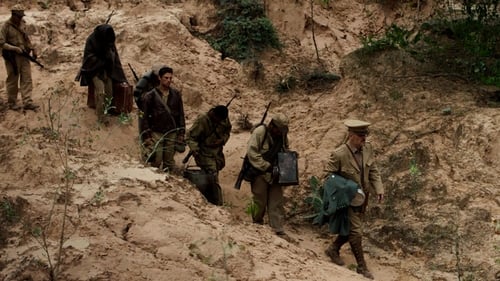
Writer
En 1934, Bolivia está en guerra con Paraguay. Liborio y Ticona y otros soldados indígenas bolivianos se pierden en el infierno del Chaco, bajo el mando del capitán alemán Kundt. Están buscando al enemigo paraguayo que no han visto en meses y que nunca encontrarán. Se van juntos en una búsqueda que les hará darse cuenta, progresivamente, del destino en el que han sido empujados y la condición inevitable de una tropa derrotada. Están caminando como sombras, vagando para siempre en medio del polvo y el silencio.

Director
En 1934, Bolivia está en guerra con Paraguay. Liborio y Ticona y otros soldados indígenas bolivianos se pierden en el infierno del Chaco, bajo el mando del capitán alemán Kundt. Están buscando al enemigo paraguayo que no han visto en meses y que nunca encontrarán. Se van juntos en una búsqueda que les hará darse cuenta, progresivamente, del destino en el que han sido empujados y la condición inevitable de una tropa derrotada. Están caminando como sombras, vagando para siempre en medio del polvo y el silencio.

Producer
When the colourful ice-cream van rides through the deserted streets of the village, there are no children trailing behind it. In Plazuela, a peaceful hamlet lost in a mountainous region of Ecuador, only a handful of old ladies remain, who are all widows. In the gloom of their houses, photos of those who are gone hang on walls: husbands who have passed away a few years earlier, children gone to work in the big cities or abroad, and grandchildren who have grown up far away from them.

Writer
In the San Pedro male prison of La Paz, Bolivia, 1500 prisoners coexist in a space originally designed for only 300 nuns. Inside, it is like a small city, with businesses and services abound. The prisoners make their living inside the enclosure as they would outside. There is a strong self-organization that plans every-body's lives. As if it weren't enough, there are hundreds of women, wives of the inmates, and almost 300 children, who chose to share their captivity. They are non-convicted beings that accepted living behind bars with the only purpose of preserving a united family. The documentary shows the life of a family inside the jail of La Paz.

Director
In the San Pedro male prison of La Paz, Bolivia, 1500 prisoners coexist in a space originally designed for only 300 nuns. Inside, it is like a small city, with businesses and services abound. The prisoners make their living inside the enclosure as they would outside. There is a strong self-organization that plans every-body's lives. As if it weren't enough, there are hundreds of women, wives of the inmates, and almost 300 children, who chose to share their captivity. They are non-convicted beings that accepted living behind bars with the only purpose of preserving a united family. The documentary shows the life of a family inside the jail of La Paz.

Director
What can represent the confinement for a person. The emotions, changes, uncertainties and traumas that are generated in a space/situation limit. Place from where a particular form is constructed to see the life and the freedom.




